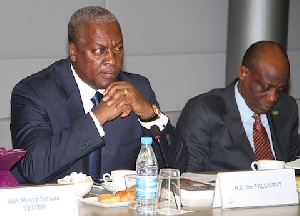 President with Mahama Finance Minister Seth Terkper
President with Mahama Finance Minister Seth Terkper
Ghana’s economy could suffer the fate of Greece sooner than expected if government does not change its appetite for borrowing, the Institute of Fiscal Studies (IFS) has predicted.
In its latest analysis on ‘Public Debt and Sustainability,’ IFS said “given the high level of public debt, there is an urgent need for a well grounded fiscal framework to anchor fiscal policy and guide it towards the achievement of the medium term objectives.”
Credible policies to restore debt sustainability, macroeconomic stability and a return to high growth and job creation are needed. Otherwise, the country will very soon be on a debt meltdown like Greece.
The European economy had been on a meltdown since 2009 and despite the International Monetary Fund’s intervention, Greece is yet to recover from the economic disaster. The ‘great recession’ led to a crisis of confidence, indicated by a widening of bond yield spreads and the cost of risk insurance on credit default swaps compared to the other Eurozone countries.
On June 30, 2015, Greece became the first European country that failed to honour an IMF loan repayment. At that time, Greece's government had a debt of €323 billion.
Executive Director of IFS, Professor Newman Kusi said fiscal adjustment will need to be strengthened in 2016.
However, the real challenge is whether government will be able to demonstrate fiscal prudence in the run-up to the 2016 general elections.
The policy and economic think tank explained that the debt composition has become a major source of risk, trapping government and the bank of Ghana in a vicious cycle of short maturity, high risk currency depreciation-high debt levels.
“This underscores the call to the government to slow down borrowing, especially borrowing from foreign sources, unless the borrowed funds are used to finance projects that can generate funds within a reasonable time to pay off the debt,” it noted.
Such foreign-financed projects, it added should also seek to strengthen the structure of the economy by broadening the production base, reducing its over-dependence on a few primary and unprocessed export commodities, support the manufacturing sector and reduce the high import dependence.
The report emphasized that the expected hike in the value of the United States dollar and interest rates by December 2015 indicate that it will be more costly to borrow from foreign capital markets, especially when the cedi continues to depreciate against the dollar.
Many analysts believe that the high coupon rate of 10.75 percent secured for the September US$1.0 billion Eurobond is a reflection of the weakening investor appetite for and loss of confidence in Ghana’s debt because of the lingering doubts about long-term macroeconomic stability and fiscal sustainability.
High levels of debt, interest costs and continued borrowing may also have serious negative impact on Ghana’s sovereign credit rating, impairing the country’s ability to service its debt.
Total public debt service-to-revenue ratio including payments on external and domestic debt) is not only on a rapidly increasing path but has breached the indicative long term threshold. Debt service now absorbs a large part of domestic revenues, leaving the country vulnerable to shocks.
Ghana’s public debt stood at GH?4.9 billion, equivalent to 26.2 percent of GDP at the end of the HIPC/MDRI period in 2006.
The debt stock increased to GH?9.8 billion at end-2008, which was equivalent to 34.8 percent of GDP, reflecting the large fiscal deficit of 14.5 per cent of GDP posted in the year as well as the impact of the currency depreciation on the foreign debt-to-GDP ratio.
All other debt indicators have deteriorated owing to deteriorated domestic and external borrowing conditions, weak fiscal consolidation, and weakening of the domestic currency.
As a percentage of domestic revenue, debt service increased from 20.1 percent in 2009 to 78.8 per cent in 2014.
In relation to exports, however, debt service increased from 73.5 per cent in 2009 to 78.7 per cent in 2014.
The IMF has projected that the country’s public debt/GDP ratio will reach 72 per cent again by the year-end (IMF, October 2015).